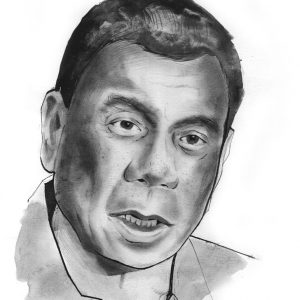Rodrigo Duterte is a popular yet controversial mayor who rules Davao City with an iron fist. Since putting himself forward as a candidate for the Philippine presidency his brusque style has shaken up the race
From our January 2016 issue – download the complete issue via our app here
To some, he is a no-nonsense local politician who gets things done. To others, he is an unabashed brute who is not afraid to ride roughshod over such niceties as due legal process. Whatever the case, last month’s announcement that Rodrigo Duterte was entering the Philippines’ presidential election means the run-up to the May poll just got more interesting. Now in his seventh term as mayor of Mindanao’s Davao City, he has been dubbed ‘Duterte Harry’ by media thanks to his tough-guy persona.

“It’s a welcome addition because it makes the campaign exciting,” said Aries Arugay, an associate professor at the University of the Philippines Diliman. “It makes it very uncertain, but in a good way.”
Based on Duterte’s previous form, we can be sure the motorbike-riding ladies’ man will make plenty of outlandish statements in coming months. The 70-year-old, who suffers from Buerger’s Disease, an inflammation of blood vessels linked to smoking, has even speculated that he may not last the six-year term if elected.
“He does come across as very rough,” said Steven Rood of the Asia Foundation. “Though well-educated, he adopts street mannerisms and boastful ways of talking.”
Recent examples appear to prove the point. Last month, he shrugged off accusations from Amnesty International’s Philippines office that 700 extrajudicial killings have been carried out during his tenure in Davao – considered the Philippines’ safest city – by estimating the number of deaths to be 1,700. In the same month, Duterte was unafraid to name the Jesuit priest he claimed molested him as a teenager. The self-professed Catholic also recently called the Pope a “son of a bitch” for causing a monumental Manila traffic jam during the pontiff’s visit in January last year.
While he may be adept at grabbing the headlines, thus far Duterte has presented few concrete policies. As Arugay puts it, Duterte likes to rant. But beneath the bluster, there could be something that will strike a chord with the populace. He is an outsider who was born in the Visayas, the central grouping of islands in the Philippines, and is now a mayor on Mindanao. He speaks to those who yearn for more equal distribution of wealth and for security – something he has brought to Davao, despite questionable methods. Crucially, unlike many politicians in the Philippines, he has not financially enriched himself while in office.
“He wants to fight corruption, which is the goal of [presidential candidates] Roxas and Poe,” said Arugay. “But somehow their credibility is undermined because their campaign against corruption is selective.”
The crop of other hopefuls – current vice-president Jejomar Binay; the ruling party and President Aquino’s preferred choice, Manuel ‘Mar’ Roxas II; and political neophyte Grace Poe – bring little that is new in their campaigns. But Binay and Roxas have formidable capital and backers behind them and, in past presidential polls, it has been the funding and networks that have helped to sway voters.
Yet in recent months, according to Rood, Duterte has shown considerable skill in propelling himself from being the mayor of a city in the far south into a nationally prominent figure. “He was assiduous in travelling the country, under the guise of discussing federalism,” he said. And the possibility of more devolvement of power could well appeal to those unhappy with the central government.
But whether he can utilise his experience as a successful mayor on a national scale is a “different matter entirely” said Rood. And he may be found wanting on the international stage. “Interacting with foreign leaders might be a challenge,” Rood added. “He is not the least bit diplomatic, likes to curse and speak in Filipino, and has not really welcomed diplomats and foreign dignitaries to his city.”
Keep reading:
“The punisher’s paradise” – Contrary to type, one city in the southern Philippines is known for its clean environs, low crime rates and roguish mayor. But some question whether the ends justify the means


